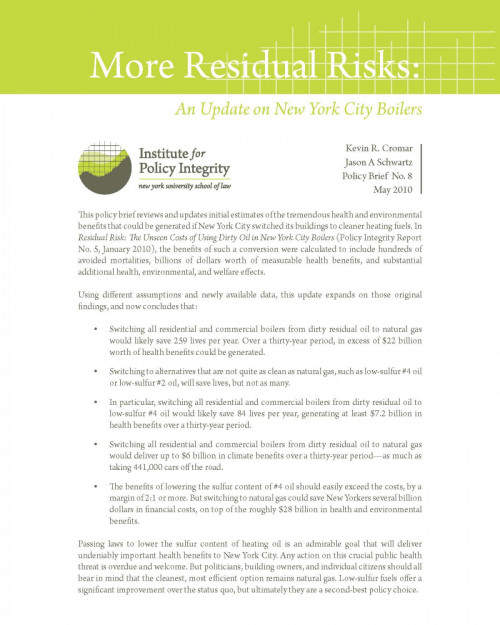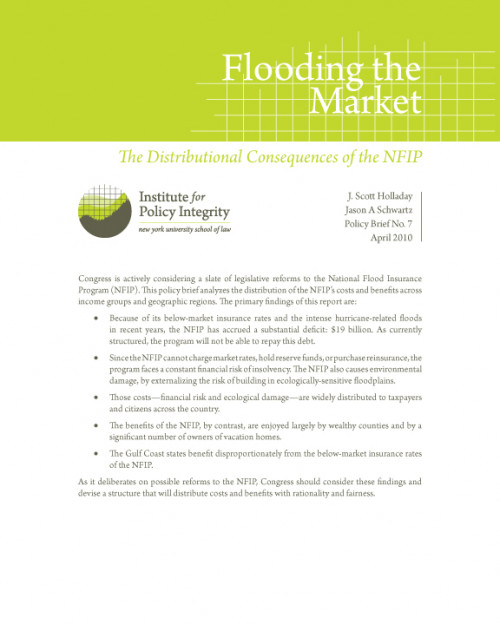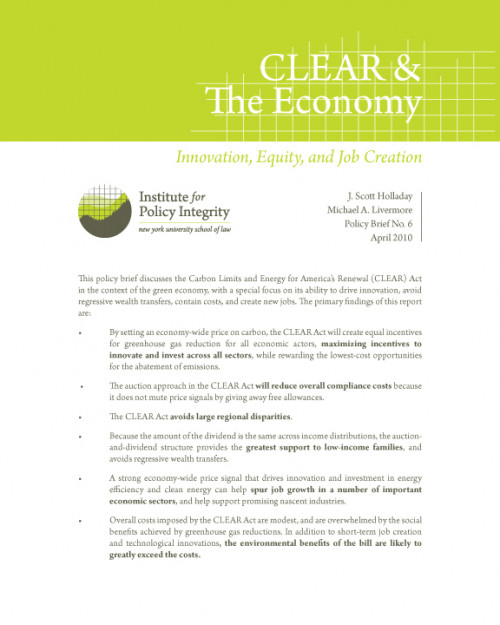-
EPA analysis of Kerry-Lieberman only offers half the picture
The EPA’s economic analysis of the climate bill in the Senate came out today and unfortunately reveals only half the picture. It looks only at the costs that the bill would impose (described as modest) but does not at all address the benefits.
-
Why is the government skewing the economic analysis for coal ash regulation?
Recently, the EPA released an unofficial, pre-publication copy of a regulation designed to address coal ash, the toxic leftovers of the coal-combustion process.
-
Policy Integrity Testifies at NY City Council Hearing on Clean Heating Oil
Policy Integrity legal fellow, Jason Schwartz, testified this afternoon at a hearing on a bill that would restrict the use of the dirtiest fuels used to heat some New York City apartments.
-

More Residual Risks
An Update on New York City Boilers
Up to 259 lives could be saved every year if certain large buildings in New York City stopped burning dirty heating oil. Using newly available data, a reworked analysis finds that residual oil has even greater consequences than estimated in an earlier report.
-
Public comments in support of safe prisons
Today is the deadline for public comments on a Department of Justice regulation that would protect individuals in prison from sexual assault.
-
Responses to Policy Integrity fuel efficiency public comments
Today, federal agencies issued new regulations on fuel efficiency standards—for the first time, limiting the amount of greenhouse gas emission allowed from cars and trucks.
-
Comments on FCC Future of Media Project
Today marks the deadline for comments on the Federal Communication Commission’s Examination of the Future of Media and Information Needs of Communities in a Digital Age, a task force dedicated to solving the crisis in the media. The shift to online news consumption has led to falling revenue, major lay-offs, cuts in coverage, and serious questions about the future of journalism.
-

Flooding the Market
The Distributional Consequences of the NFIP
The government’s flood insurance program gives discounts to homeowners who build in flood-prone areas, often causing significant environmental damage. In this analysis, the Institute for Policy Integrity finds that this practice can benefit wealthy owners of expensive homes at a cost to the average taxpayer.
-

CLEAR & The Economy
Innovation, Equity, and Job Creation
The CLEAR Act, sponsored in the Senate by Maria Cantwell (D-WA) and Susan Collins (R-ME), would place a price on carbon, auction 100% of the pollution permits, and refund most of the revenue back to consumers. This brief found that pricing carbon would spur investment and innovation in new energy technologies, giving a substantial boost to industries like manufacturing and construction—both hit hard in the recent financial crisis. Relatively well-paying jobs would be generated in these sectors, helping to mop up the slack created by the recession.
-
Public Comments on White House Cost-Benefit Proposal
Policy Integrity submitted comments today on proposed changes to the White House Council on Environmental Quality (“CEQ”) Principles and Standards for Water and Land Related Resources Implementation Studies. The proposal was released on December 9, 2009 and today marks the deadline for comments.
